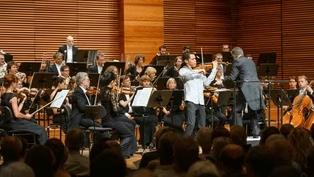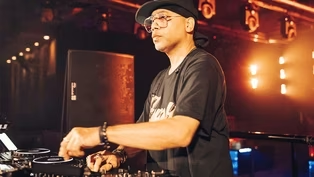
New Henry Louis Gates docuseries explores gospel’s history
Clip: Season 52 Episode 6 | 10m 13sVideo has Closed Captions
“GOSPEL” Director Stacey Holman discusses Henry Louis Gates, Jr.’s latest PBS docuseries.
A new PBS docuseries, “GOSPEL,” from Henry Louis Gates, Jr. delves into the origins and influence of gospel music on Black spirituality. Host Stephen Henderson talks with Stacey L. Holman, the director and producer of the docuseries, about gospel's rich history, its impact on the Black church, Detroit’s connection to the genre, and how other music genres have been influenced by gospel.
Problems playing video? | Closed Captioning Feedback
Problems playing video? | Closed Captioning Feedback
American Black Journal is a local public television program presented by Detroit PBS

New Henry Louis Gates docuseries explores gospel’s history
Clip: Season 52 Episode 6 | 10m 13sVideo has Closed Captions
A new PBS docuseries, “GOSPEL,” from Henry Louis Gates, Jr. delves into the origins and influence of gospel music on Black spirituality. Host Stephen Henderson talks with Stacey L. Holman, the director and producer of the docuseries, about gospel's rich history, its impact on the Black church, Detroit’s connection to the genre, and how other music genres have been influenced by gospel.
Problems playing video? | Closed Captioning Feedback
How to Watch American Black Journal
American Black Journal is available to stream on pbs.org and the free PBS App, available on iPhone, Apple TV, Android TV, Android smartphones, Amazon Fire TV, Amazon Fire Tablet, Roku, Samsung Smart TV, and Vizio.
Providing Support for PBS.org
Learn Moreabout PBS online sponsorshipNoted historian and storyteller Henry Lewis Gates Jr. Has a new documentary series launching on PBS this month, and it's called "Gospel."
The series explores the rich history of Black spirituality through sermon and song.
"Gospel" can be seen right here on Detroit Public Television on Monday and Tuesday, February 12th and 13th at 9:00 PM.
Here's a preview followed by my conversation with the series producer and director, Stacey Holman.
(upbeat music) - The Black preaching tradition is deeply connected to gospel music.
Our singers preach and our preachers sing.
- God, we ask that you re-invigorate somebody.
- [Narrator] You feel it deep down in your soul.
It makes you wanna shout, it makes you wanna sing.
♪ Glorious - That's beautiful.
- Stacey Holman, it's always great to see you.
Thanks for joining us again here on "American Black Journal."
- Thank you for having me.
It's great to see you guys again and excited to be here, Stephen.
- So this is an exciting subject to talk about, and of course, the work that you've been involved in this PBS series on gospel I think is a look at something that I think of as absolutely foundational to all kinds of different parts of the Black experience, right?
We think often of gospel as relating to the Black church, which is of course where it comes from, but it powers so much else in our lives, and not just for African-Americans, this is an American foundational institution.
- That's right, Stephen.
The term gospel didn't start with Thomas A. Dorsey.
It actually goes way back with a white woman whose name completely escapes me right now.
But like anything, once it gets to the hands of Black people, we add a little hot sauce.
We add a little spice to it, and it becomes just this institution and the signature sound that we've come to know and recognize as gospel.
- So let's talk about the series.
What will viewers learn about gospel?
What do you hope they take away from this deep dive into the subject?
- Well, this is a continuation follow up to the Black church, as you said, and we've called it, our name for it was "Black Church: The Musical."
So we talked about the institution, but now it's about the sound.
We start in the great migration and we take it all the way to present day.
So for Thomas A. Dorsey to C.L.
Franklin, Aretha Franklin, the Clark sisters, Andrae Crouch, Kirk Franklin, and Chandler Mork and so on.
So they'll get a really clear understanding of just where the sound was formed, how it was formulated.
Like I said, hot sauce, cayenne pepper, whatever, you know.
So you have blues, you have jazz, you have just all these different flavors and textures.
But also too, you're gonna understand the sound of preaching in this series.
We didn't dive deep into that in the first series and really understand the sound and just really the style of preaching from hooping to reading from the scripture and you write from the text and just the different standards that people present, men and women present the word.
So it's gonna be really an exploration of the sound and really give people a better understanding and appreciation that this is a craft.
This is not something that the spirit moves.
The spirit does move, but you gotta work.
There's a lot of work that goes on behind the scenes.
- There's an awful lot of discipline I think.
And any sort of excellence like this that's not always apparent to the people who are listening.
I wanna talk about Detroit's role, of course, in this, and of course as a city that's home to one of the largest African-American populations in the country and historically has been so important.
Of course, we show up, we show up in this a lot, I feel like.
- I mean Detroit's foot, elbow, hand is all in it.
When we were doing the series, we were breaking it down in terms of parts of the country.
So in each hour, hour one is Chicago, hour two is really focused on Detroit, hour three is about LA, and hour four is about the South.
But like you said, Detroit is like also not only in two, it's in hour three, I mean, you have C.L.
Franklin, you have Aretha Franklin, you have the Clark sisters, Mattie Moss Clark, the sound.
It's definitely part of that Canaan when it comes to what the Black church is, the Black sound and the legacy of it, and just how instrumental all of these men and women were in creating.
Aretha brought the soul, C.L.
Franklin, not just only the craft of his preaching with hooping.
He also made an industry, I mean, his records, the Million Dollar Voice, every preacher we spoke to, 99.9 of them said that he was one of their favorite preachers, and a lot of them all wanted to hoop, but he's the master of it.
And even through the Clark sisters and Mattie Moss Clark, everybody really was instrumental in the foundation of it.
And Detroit, hats off to Detroit for that.
- Yeah, and at the same time, of course, gospel and its influence here in Detroit and its influence on our music also leads us to all this other music.
Motown, of course, is a really great touch point or touchstone for that.
But lots of other music as well comes out of and finds its roots in gospel.
And it's not just someone like Aretha who is using gospel as the foundation for pop music, right?
I mean, you can hear the church in so many of her songs.
It's also that the rhythm, the structure, the chord progression, and all those other kinds of things seep into other parts of the music of our nation.
And jazz and pop and soul and rock all have a lot of...
They have a lot to pay back to gospel.
- That's true.
I mean, Rosetta Tharpe is a perfect example.
We credit Chuck Berry, some folks credit Elvis Presley.
It was really Rosetta Tharpe that her guitar, that rhythm, that riff that she created, that she learned and she crafted while in the Church of God and Christ, that became rock and roll.
So it's completely, the church is a laboratory, it's the rehearsal space where you can perfect and you can hone this craft, and then you can put some of it in R&B, you can put some of it in hip hop, you can mix all of it together.
And I think that's one thing very unique about gospel is it can go across all the genres and still remain true to what the message is in many instances like Sam Cook, he's talking about, Jesus loves me, but you just switch it to baby loves me.
And you got yourself a gospel hit and you got a pop song.
So it caters to all genres.
- I also wonder if you can talk just a little about the future of gospel as it relates to the future of the church.
I mean, churches all over are having newfound challenges, making sure that new generations of Americans and especially Black Americans come up in the traditions.
What does that mean for something like gospel, which of course has gone so far beyond the church, but still finds its its initial power in the pews?
- And hour four really explores that, which is Shayla Harris' hour, who is raised in Detroit, the Michigan area.
And what we explore and really what she focused on is that there's this question of praise and worship, and there's this battle of where's gospel in the praise and worship.
You had the choir who would sing the song and the congregation to respond to it, but now you have the praise and worship team singing along with the congregation.
So I think there's this conversation or even this kind of struggle back and forth of where music is gonna be, and the where music lays in the church.
But if you look throughout history, that's always been a question from Thomas Dorsey, when he came, from Mahalia Jackson, things have shifted.
From Andrae Crouch, things shifted.
And even today with the praise and worship, things have shifted.
So I think it's just evolving, and I think everything kind of comes circle again.
- And the "Gospel" series kicks off with a special companion concert on Friday, February 9th at 10:00 PM, followed by the four hour documentary on February 12th and 13th.
Nathan Amaral wins 2024 Sphinx Competition Senior Division
Video has Closed Captions
Clip: S52 Ep6 | 2m 48s | Watch violinist Nathan Amaral’s first-place performance at the 2024 Sphinx Competition. (2m 48s)
Tapping into Detroit’s techno roots with producer Carl Craig
Video has Closed Captions
Clip: S52 Ep6 | 2m 48s | Trailblazing Detroit=born techno producer Carl Craig on the Black music experience. (2m 48s)
Providing Support for PBS.org
Learn Moreabout PBS online sponsorship
- News and Public Affairs

Top journalists deliver compelling original analysis of the hour's headlines.

- News and Public Affairs

FRONTLINE is investigative journalism that questions, explains and changes our world.












Support for PBS provided by:
American Black Journal is a local public television program presented by Detroit PBS

